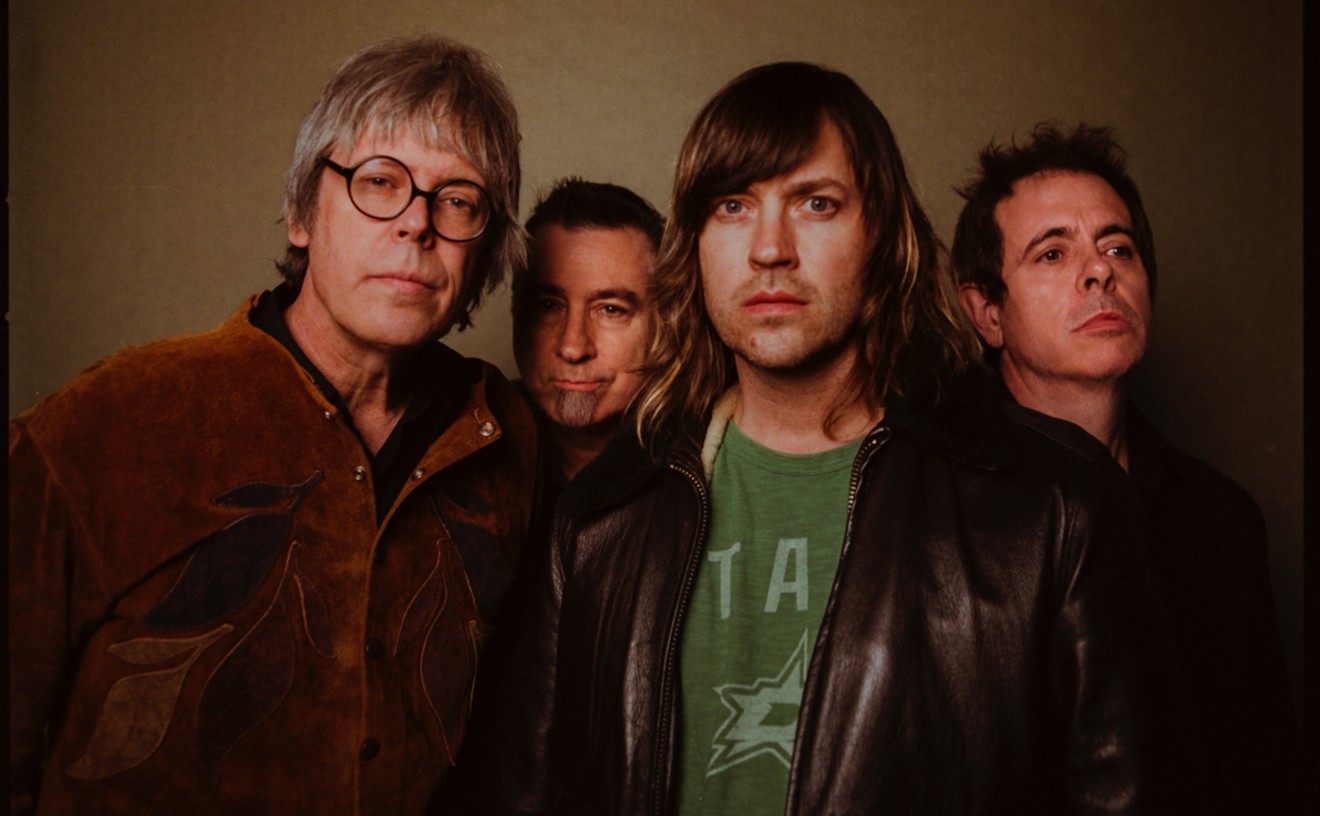They were improbable partners to begin with, people "unlikely to be in the same group together," says Buckingham, who joined in '75, when Fleetwood hit his head on Buckingham and Nicks' soft rock and thought it dreamy. "There was a bass player [McVie] who would probably describe himself somewhere between McCartney and Mingus, a drummer [Fleetwood] who's a total garage guy and a sublime primitive and a band that had been around in several incarnations and evolved from being a 12-bar blues band into many, many other things." In other words, they had no business playing together, much less staying together, yet for a while, in the mid-'70s to mid-'80s, theirs was a lucrative partnership: They made great music, which in turn made much money. Fleetwood Mac was the Clear Channel of the 1970s: They owned all of radio.
Then, for a while, in the early '90s and a little afterward, the band disappeared and seemed no longer to matter, and the stories seemed of a different, long-ago era--The Age of Excess, before the dinosaurs had turned to fossils. They had gone their own way, more or less. Buckingham, who loved studios the way Robert Plant loved women, moved into the basement to make music for which he answered to no one. The band soldiered on without him; it had survived numerous lineup changes since the late 1960s, when Peter Green and Jeremy Spencer played psychedelic till snapping psychotic, so surely the body could be sustained with two men replacing one. There would be the one momentary reunion of the platinum band, at the inauguration of a president who conducted himself like a rock star feasting on the tour-circuit buffet of cold cuts and hot chicks, but the body only crumbled further. By 1994, with Nicks and Christine McVie spirited away, the band released an album called Time--something Fleetwood Mac had, at last, run out of.
"Evolution, I suppose, gets harder the longer you go," Buckingham says now. "You know, my own road has been so convoluted with the band. I really did have to leave and sort of take stock of what all of that had meant and try to hold onto my own idea of wanting to be creative in a long-term sense. It had gotten to the point where there had to be a pulling apart in order to do that. We probably wouldn't be doing what we're doing now if we hadn't had such a kind of a spotted history in the late '80s and '90s."
Amazing but true: For a band broken up as lovers then busted up as collaborators, the heart still beats. The band is minus one--Christine, who joined again then jumped again, unable to recommit herself to a relationship that had made loving fun and rather horrible--but in relatively good shape, all things considered. Fleetwood Mac tours in support of an album that didn't even belong to it, till Buckingham decided it wasn't quite right to keep it to himself.
Say You Will, released earlier this year, does not belong in the ranks of the immortal works the band recorded when it was first together and breaking apart together. It doesn't delight like Fleetwood Mac, which, with such songs as "Monday Morning" and "Landslide" and "Say You Love Me," sounds like the first warm afternoon after a frigid winter. It doesn't resonate like Rumours; few albums in rock's history do, if only because few albums dared make public the private discord of men and women falling so viciously out of love. Nor does it dazzle like Tusk, the weirdest, most expensive pop album ever made by a band running from its own success.
Say You Will is more reminiscent of Buckingham's 1992 Out of the Cradle than its Fleetwood Mac predecessors--in other words, some tricky guitar shit, too noisy to be called ambient but too into itself to be considered easy listening. (And that's what the Mac was even at its best: adult-contemporary pop, with the emphasis on adult; you might have dug it as a kid, but realize only as a grown-up there's substance to what might have been deemed twee and slight way back when.) Buckingham, on such songs as "Red Rover" and "Peacekeeper," no longer sounds like the child of the Byrds and Beach Boys, heavy-felt presences on Fleetwood Mac and Rumours, but a man who's spent a good chunk of time listening to the sounds in his own head and trying to find room in there for the voices of others, chief among them the woman he used to call partner and then some.
"My leaving and doing one album that allowed me to put a band together, that was more conceptual and allowed me to get my confidence back and all that led to what's going on today," Buckingham says. "A song like 'Red Rover' was sort of an outgrowth of a presentation of a song like 'Big Love' [off 1987's Tango in the Night, Buckingham's last studio album with Fleetwood Mac] onstage, where you're thinking, 'Oh, geez, one guitar and one voice played with a vengeance and with a certain complexity can really work.' It became a question of how do you expand that concept into sort of still making it a record but not losing the idea of a one-guitar performance behind drums and bass and all the other stuff, you know? That kind of song is actually what I'm the most interested in pursuing. And there are more of those, I hope, that will be on subsequent albums, whether they're..." He pauses. "I would like to think there will be more Fleetwood Mac albums, but being what we are, you never know."
And what they are remains the same: a traveling melodrama, makers of timeless melodies and keepers of a story no one ever seems to tire of hearing or telling. In March, Rumours was again awarded another platinum certification from the Recording Industry Association of America--19 million albums sold, and still counting. Buckingham even acknowledges that Rumours was, and remains, hot product not solely because of the music, but also because "we were bringing out the voyeur in everybody." Time has done much to heal old wounds but little to mask them. He still speaks of the period when he broke up with Nicks, of the craziness and heartbreak surrounding the making of Rumours, of having to come together as a band when he and Nicks and the McVies were falling apart as couples. To this day he can't listen to or speak of Rumours without recalling that period; it's not a distant memory at all, but something that remains a constant in the rearview mirror.
The question is put to him whether there was a moment when he realized that the songs on Rumours, chief among them "Go Your Own Way," "Dreams," "Don't Stop" and "You Make Loving Fun," transcended their status as commercial and radio hits, their brushes with chart infamy. He pauses, as if trying to jar loose the memory. One is not forthcoming.
"I think it's very difficult to be objective about that sort of thing," he explains. He says he is unable to "perceive a whole album and appreciate the way other people hear it, because you think in terms of the process and you think of what you went through to get certain things done. Rumours will never be..." He pauses. "The associations of what we had to do to get that album done, and for me, personally, having broken up with Stevie and then having to produce her and make hits and go through this massive exercise in denial, which actually lasted for years beyond Rumours, I always think of that as the very beginning. It was so stark. We were sitting up there in Sausalito, and it was just wild. It's hard to sort of separate that.
"Yes, there were moments of great clarity and moments of elation and the sense of triumph when certain things turned out, but it was all fraught with all this other stuff, you know? So I don't think any of those albums, really, are able to be seen by me or any other band member particularly objectively. I think at this point in our careers, we can sort of understand it a little more now."
But surely the voyeuristic appeal has faded with time; the songs that made up last year's The Very Best of Fleetwood Mac collection no longer exist within the context of hurt feelings revealed through bitter and biting lyrics. You tell Buckingham there must be at least one generation of Mac fans who know nothing about its history, who don't know what Rumours is about. Doubtful, he will say.
"Still they're picking up on it, whether it's through their parents or whatever," he says. "You see them in the audience, and they're responding right along with everyone else out there. It does start to sink in that something you're doing is, in a way, timeless. I think since we've been on the road, it's been the most in-my-face that there is this long-term sense of accomplishment. I've had my own maybe slightly skewed and, at times, bad attitude about the band or what aspects of it represented and what its limitations were, especially after Tusk, when the whole thing came down that we seemed to confound the expectations of those who were looking for Rumours II.
"At that point, I was starting to make solo albums when I could and seeing the band, in some ways, as more of a corruption than anything else for a while. But, you know, we've come around from all of that, and I think one of the things I was able to do during all the time that I took off was not only get a lot of healing done of myself and my perceptions of other people, but was to appreciate how much ground we're covering as a band. It's nice to be back doing this and wanting to be here."










